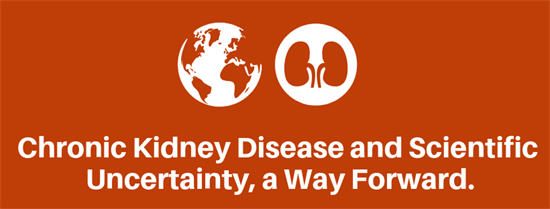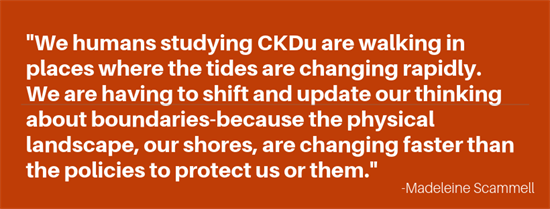|

|

Chronic Kidney Disease & Scientific Uncertainty,
a Way Forward
Volume 24 (3) March 2019
|
"Pesticides are an especially vexing exposure to study due to the fact that chemical policies in the US are anti-precaution. Chemicals are innocent until proven guilty, and policies that protect industry trade secrets prevent researchers (and even the federal government) from knowing the chemical composition of many widely used agrichemical products. SEHN’s advocacy for more transparent chemicals policies and right-to-know laws is essential for public health research and disease prevention. For the vast majority of public health researchers, our goal is to prevent disease, which is a second element of the precautionary principle: Set goals for health protection."
-Madeleine Scammell
|
|
|
|
Friends of SEHN,
March is World Kidney Month – dedicated to awareness, research, prevention, and treatment of kidney disease. In order to highlight kidney disease, a changing climate, and current ways forward in environmental public health research, we turned to the Chair of our Board of Directors, Madeleine K. Scammell. Madeleine has long been involved in public health and the environment, the democratization of science and technology, and community-driven and community-based participatory research. As you will read below, Madeleine’s work in the field of environmental public health and the study of Chronic Kidney Disease ties together many themes of SEHN’s work: ecological medicine, the precautionary principle, and the role of government.
We are grateful for Madeleine; her insight, her passion for her work, and her investment in the health of communities and future generations.
Kayhla Cornell
SEHN Research & Communications Senior Associate
|
 |
|
Good friends challenge you. They help you be your best self. For nearly 25 years, Carolyn Raffensperger has been a very good friend to me. When she asks me to do something, I know I will be challenged. And every time, I am better for it.
March is World Kidney Month. Because I study an epidemic of chronic kidney disease in Central America, Carolyn, and Kayhla Cornell, asked me to write something for the Networker about my research and how it relates to the principles of SEHN.
The last time I wrote a piece for Networker, it was because Carolyn asked me to write about the connection between a Danish-style consensus conference on the topic of biomonitoring, and music. In that piece I referred to Zimbabwean musician, Oliver Mtukudzi, known by his fans as Tuku. Tuku was one of my favorite musicians and I was fortunate to see him perform more times than I can count. Last month Tuku shocked his fans by dying at the age of 66. The cause? Complications of diabetes.
Diabetes is one of the primary causes of chronic kidney disease.
Chronic kidney disease (CKD) is the gradual decline of kidney function. Our kidneys filter all the blood in our body approximately every 30 minutes, removing toxins and waste (excreted in urine), keeping the blood clean as it is pumped by the heart and circulates through the body.
In the case of diabetes, the inability of the body to process sugar results in excess glucose in the blood. Over time, the glucose being filtered by the kidney causes damage to the cells in the kidneys-- it is toxic. The damage accumulates, cell by cell, until kidney function declines.
It is normal for kidney function to decline over time; the job of filtering our blood takes a toll on even the healthiest of kidneys. Along with diabetes, age is a major risk factor for chronic kidney disease. Other causes of kidney disease include autoimmune diseases (e.g. Sjorgrens Syndrome and Lupus), medications (e.g, NSAIDs and chemotherapeutics), exposure to heavy metals (lead and cadmium), and other chemicals that contaminate drinking water supplies.
Three aspects of SEHN’s work have fundamentally influenced my approach to research, my study of kidney disease, and importantly, my decisions about where I work and with whom: The precautionary principle, ecological medicine, and the public trust doctrine.
|
 |
|
The precautionary principle is rooted in the German principle of foresight. In the US, SEHN co-hosted the conference in January 1998 that led to the Wingspread Statement on the Precautionary Principle. At that time, I worked for a nonprofit organization whose mission was to democratize science and technology (we are still working to accomplish that mission…). The executive director, Dick Sclove, was a signatory on the statement, as was David Ozonoff, who I would work for three years later as a graduate student at Boston University School of Public Health (BUSPH). The precautionary principle has several critical elements, the first being the duty to take precautionary action in the face of uncertainty. As a graduate student and now an environmental health scientist, this element of the precautionary principle affects how I think about study design and conduct. No matter how good a study is, people will criticize it. Science rarely speaks for itself. As public health professionals, the precautionary principle challenges us to act for the benefit of public health even when the science is uncertain. It is also fundamentally an acknowledgement that science does not generate universal proof, it does not tell us what is true or false in such a manner that all will agree (think about evolution v. creation, round or flat world), nor is any single study likely to be the impetus for action.
As a student at BUSPH, and still today, I helped to create a book, along with SEHN and other contributors, a Guide for communities thinking about health studies. The Health Studies Guide is essentially written to help community groups affected by environmental health hazards and/or illnesses think about the pros and cons of initiating a study to address their concerns. As Dick Clapp, a contributor to the Guide, once pointed out, epidemiology is by definition anti-precautionary; by the time we are studying associations between exposures and disease, there is already disease. This is a major limitation of our approach. I am working on a study now that follows people over time, essentially waiting for them to get sick so we can then examine what exposures were experienced by those who became ill versus those whose kidneys stayed healthy (a prospective cohort study). Etiologic studies don’t stop disease. But so often, people with disease look to scientists for answers, and the tools we have to provide them are dull; our answers often plagued with caveats and uncertainty.
|
 |
READ MORE.
|
|
|
|
|
|
|
|
|
|
|

SEHN, PO Box 50733, Eugene, OR 97405
|
|
|
|
|
The Science & Environmental Health Network | moreinfo@sehn.org | moreinfo@sehn.org | moreinfo@sehn.org | SEHN.org
|
|











